Interview with Paul Bulcke, CEO, Nestlé S.A.
“Our concern is to ensure that different ways of thinking are integrated in all our decision processes.”
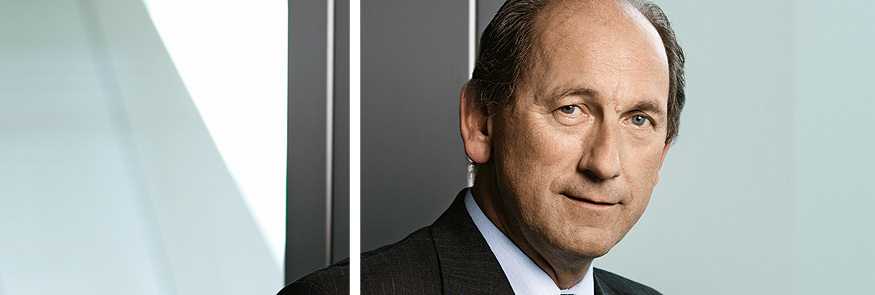
1
For Nestlé as a globally active nutrition, health and wellness group with products sold in almost every country and manufactured on every continent, diversity is traditionally a pivotal topic. Talking with THE FOCUS, Nestlé CEO Paul Bulcke describes how Nestlé utilizes its rich experience of dealing with diversity to help anticipate changing consumer wishes.
The Focus: Nestlé is the world’s largest food and beverage group, selling its products in every corner of the globe. Over the course of its history the company has had to come to terms with the diversity of its customers and markets, both by offering appropriate products and by adapting its internal structures. Is it safe to say that Nestlé was already grappling with the issue of diversity before it became a widespread topic on the management agenda?
Paul Bulcke: Yes, that’s a fair assessment. The company has been diverse since it was founded almost 150 years ago. For one thing, we are headquartered in Switzerland with its multitude of cultural influences – German, French and Italian. Plus Nestlé expanded into France in only its second year. That was just the beginning of our multi-national presence, which has since grown to encompass almost all countries around the globe. And without wanting to sound complacent, we aren’t just present in each of these countries – we wouldn’t be so successful if we didn’t have a genuine feel for the markets and customers. This diversity extends all the way to the company’s top leadership: the 13 members of our Executive Board come from nine different countries. And here in our Vevey headquarters alone, our employees represent some one hundred nationalities.
The Focus: Would you call this diversity a corporate value, or simply something that has developed over time?
Bulcke: No, it is certainly a value, one of our core competencies, and a competitive advantage. In fact, we have explicitly anchored respect and openness to other cultures and traditions in our Leadership and Management Principles.
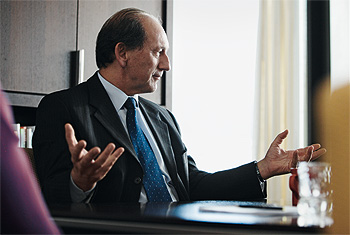
The Focus: Does this multi-nationality mean you don’t have to think about diversity and inclusion anymore at Nestlé – that by now they happen naturally, are part of the company’s DNA? Or has the company’s position on the issue changed in recent years?
Bulcke: Diversity and inclusion are topics of continuing interest to Nestlé. The more interesting and, in the end, more important question is how the company can leverage diversity to create value and growth. Right now we are finding that the world as we know it is on the verge of an historic transformation. The emerging nations – where 80 percent of the world’s population now lives – have gained the confidence to develop their own dynamics and directions. They no longer see the West as the only model to be emulated, but have their own ideas and perspectives. Western thought will cease to be the prevailing force that defines us and the world going forward. This also applies to Western business models, which will increasingly be supplemented by many different ways of thinking and doing business. Emerging nations already have higher growth rates and in the future we will generate increasing volumes of business there. That’s why Nestlé is working so hard to place more people from these parts of the world in positions of responsibility. Experience shows that offering career opportunities to talented professionals regardless of their nationality motivates exactly the right people to join our company. Our primary concern is not ensuring that the largest possible number of nationalities is represented in the Nestlé Group, but that different ways of thinking and/or ethnic perspectives are integrated and respected in all our decision-making processes.
The Focus: How do you accomplish that?
Bulcke: By asking ourselves what kind of talent we’ll need in the future. What skills will be important to a globally active corporation like Nestlé in the years to come? What is the best way to handle innovations that come from the new markets? And how do we ensure that our Western-dominated perceptions don’t blind us to opportunities?
The Focus: And how does this work out in practice?
Bulcke: For one thing, we send up-and-coming managers of different nationalities to these emerging countries. But mostly we need local talent – people with a deep-seated understanding of the mentality of each place, with a feeling for the man on the street and his consumer habits and preferences. An MBA from a Western business school won’t necessarily help you here. And consumer segments in emerging nations are evolving as well. We are seeing what we like to call “emerging consumers.” Sections of the population who were previously ignored by companies because they barely had enough to survive are now slowly beginning to benefit from the growing economic prosperity of their nations. It goes without saying that their preferences and means are vastly different from those of consumers in industrialized nations. This is a kind of social diversity, and we need to offer appropriate products in response. So we need people who have a detailed understanding of the preferences and aversions of the different strata of societies.
The Focus: Nestlé is said to have a very strong corporate culture. Many of your managers have spent their entire careers with the Group. Doesn’t this degree of corporate socialization result in a certain uniformity? How do you keep your people open to progress and change?
Bulcke: It’s true that we have a strong culture, but like I said, diversity and inclusion are important parts of it. Look at how we handle partnerships and acquisitions, for instance.
We recently entered into a partnership with a Chinese company, a candy manufacturer that employs 24,000 people. We will continue to run this company with the help of the families who founded it. And we are open to learning from our Chinese partners. After all, they know their home market better than any outsider ever could. This is our understanding of inclusion – the inclusion of this company’s dynamic. And this is how we usually handle partnerships and acquisitions. If a company is successful it’s a mistake to replace its management. We also make certain that our goals and more importantly the values align, however – because part of embracing diversity is making sure that employees and managers from independent units feel part of the Nestlé Group. And our culture is the glue that holds us all together. At its core is a sustained passion for quality in everything we do. That may not sound particularly original, but we pursue this value so explicitly and persistently that every one of our employees understands what it means to their daily work.
The Focus: You mentioned showing respect for other cultures. How is this reflected in the company’s daily business?
Bulcke: Take our Corporate Business Principles. They form the basis for our business practices across the Group, and we have had them translated into over 50 languages. Of course we could have made English our “official” language as many other globally active corporations have done. The translation effort wasn’t merely a sign of respect for other languages and cultures, however – we wanted to communicate the values and practices we consider important to every single one of our employees. And using their native language is the first step.
The Focus: You rightly express a sense of pride in Nestlé’s long tradition of and experience with diversity. When it comes to gender balance, however, four years ago you remarked that Nestlé is neither better nor worse than most other companies. How do you explain your apparently long-standing neglect of this aspect of diversity?
Bulcke : Perhaps we really are a bit behind the curve of societal change here. Just a few decades ago it was extremely unusual for a woman to work outside the home unless financial circumstances demanded it. In this respect we’ve seen a fundamental change. Firstly, today many countries have a pool of extremely well-educated, talented and ambitious women, but the business world is still run largely by rules that were put in place by men. For a long time Nestlé too was a man’s world. And Nestlé didn’t just fail to take advantage of all the talent that might have been available to us. Secondly, between 75 and 80 percent of our products are purchased by women – they are the ones making the daily decisions for or against Nestlé products. So it’s of the utmost importance that we should listen to the voices of these customers. And who understands what motivates a female customer better than another woman? Which brings us to the third argument for a better gender balance, the one I’d say is perhaps the most important. We have often lacked a feminine perspective in our thinking. I firmly believe that different ways of thinking complement each other and lead to better decisions. Achieving this kind of complementary thinking and raising awareness about its importance is the secret of every successful diversity and inclusion initiative. Gender Balance simply makes business sense.

The Focus: So how do you attract more women to Nestlé?
Bulcke: In our gender-balance strategy, we think it’s very important that women should not be required to think and act like men. They should be allowed – encouraged – to think and act like women. One crucial step here is to make it easier to combine work and family. That includes flexible working time models for parents, access to child care, understanding that not all careers are linear and little things like a last minute shopping service with delivery in the office. Another initiative in this direction is the network we have formed with other international corporations called the International Dual Career Network. Management positions at Nestlé and these other companies invariably involve frequent re-locations and international assignments. In families where both partners are pursuing careers, it is almost always hard to synchronize these dual career moves. Now we provide active assistance.
The Focus: What percentage of the company’s workforce is made up of women today – and what about management?
Bulcke: I don’t believe that numbers and percentages are a reflection of true diversity. And I strongly reject the idea of setting quotas. Instead, I think we should encourage the development of a natural gender balance. That could mean having 30 percent women in one field and over 80 percent in another.
The Focus: In achieving this gender balance, does it help that Nestlé has experience with other aspects of diversity?
Bulcke: Yes and no. As I said, by our very nature we are open to national diversity, but haven’t been as successful in achieving gender diversity. So obviously something wasn’t right; we had a kind of blind spot. We didn’t have the right internal attitudes or offer conditions that would encourage a higher proportion of women in our workforce, especially in management positions. I already described some of the concrete steps we’ve taken to make it easier to manage families and careers, but I think it’s even more important to establish the right mindset within the company.
The Focus: What have you done to address this?
Bulcke: Starting at Board level, we have sensitized our executives to the economic importance and necessity of achieving a good gender balance. We can’t simply ignore half of the global talent pool without long-term negative impacts. And unlike other companies who mentor their few women executives in their own, often isolated networks, we haven’t made gender balance a “women’s issue.” We have made a concerted effort to get all our executives involved – and most of them are still men. Every Executive Board member has held workshops with their direct reports to develop a gender diversity action plan for their units. And we made a point of not sending them in with predefined targets. This has not only brought all our executives on board, but minimized resistance to the issue as well. So we decided that participation and persuasion are more effective than imposing strict rules top-down. In our view, this is the best way to convince the entire company of the societal importance and advantages of gender diversity.
The Focus: How can you tell if you’ve succeeded in convincing your executives to bring more women on board – in management positions too – or if they are just paying lip service to the idea?
Bulcke: Of course, we have a whole toolbox of instruments to measure success. For example we define our talent pool and determine how many women it includes overall and at different levels. We look at the composition of the Executive Boards in our markets and how many women are included in the replacement and succession plans. Which women managers could we promote in the short term? The rule of thumb for our gender balance strategy is that every succession plan should include at least one female candidate. And if we see that progress is not being made, we identify the obstacles and work to remove them.
The Focus: Did Nestlé’s commitment to gender diversity contribute to the decision to name Wan Ling Martello, an American of Philippine and Chinese descent and former Vice President of Wal-Mart, as Nestlé’s CFO?
Bulcke: Ms. Martello’s gender played no part at all in her selection. It didn’t count for or against her – she was simply the best candidate for this position in every respect. We select our top executives based on their power to shape and influence; on their personalities with all their complexity and complementary forces.
The Focus: Despite all the benefits of diversity, an international corporation also needs a certain degree of consistency. But is it even possible to judge a Chinese manager by the same standards as an American manager, for instance?
Bulcke: The essence of good and successful leadership is basically the same wherever you go – it takes a person who is sensitive to their environment and can steer a team effectively with a defined purpose. That said, only few leaders can apply these talents universally and succeed no matter where they are. We often find that some managers are effective in a certain environment while others are not. This is exactly what we have to recognize – that leadership criteria can vary widely from one place to the next. That’s one reason why we need as much diversity as possible here at headquarters – people who understand the nuances of different markets and are therefore in a position to judge whether the local management is taking the right approach.
The Focus: Do you also evaluate the performance of your executives based on how and what they have contributed to promoting diversity within the company?
Bulcke: Yes, that does play a role in promotion decisions. But again, we don’t just look at the numbers here, but at how they shape events. We point in a certain direction and then evaluate each executive’s progress based on a number of criteria, one of which is diversity and inclusion. I don’t believe in overregulated approaches with exact provisions for every conceivable scenario. I prefer to create attitudes and approaches and to provide the tools and methods that enable people to attain their goals proactively.
The Focus: What challenges and obstacles do you see Nestlé facing in the future?
Bulcke: The biggest challenge for us and indeed for all companies is not to lose sight of what really counts. It is not the case at Nestlé, but at this particular moment, the principles of sound corporate governance are often being neglected in favor of short-sighted decisions. The global financial crisis has definitely contributed to this tendency. But it is important that Nestlé should maintain its global perspective even under difficult circumstances. Our company stands for the highest quality standards and for good products that meet a diversity of demands around the world, and this is what we must continue to offer. We also have to keep asking ourselves if we have the right leadership on board to accomplish this. But I think we have created the right environment and we have a common goal for diversity and inclusion that we all work towards.
The Focus: And how will you know when you’ve got there?
Bulcke: You never get there. It’s a bit like riding a bicycle: you have to keep moving to maintain your balance.
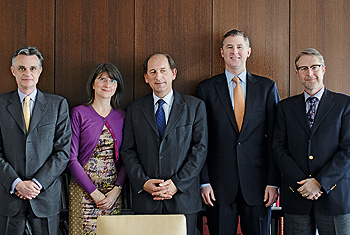
From left to right: Jean-Marc Duvoisin, Global Head of HR, Nestlé, Laurence Monnery, Egon Zehnder, London, Paul Bulcke, Dick Patton, Egon Zehnder, Boston, and Thomas F. Allgäuer, Egon Zehnder, Geneva.
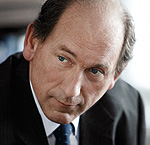
Paul Bulcke
A citizen of Belgium, Paul Bulcke was born in 1954 and studied commercial engineering and management. He moved to Nestlé at the age of 25 after working as a financial analyst for two years. Following a number of marketing and management positions as well as some operational functions in Peru, Ecuador and Chile, in 1996 Bulcke went to Portugal to take up his first post as head of a national operation. In 1998 he became Head of the Czech and Slovak markets. In the fall of 2000 he was entrusted with Nestlé’s third most important market, Germany, where he effected a successful turnaround. He then took charge of the North American and South American markets. Under Bulcke’s leadership these areas became the group’s top region in terms of both sales and profits. In April 2008, and with a career of almost 30 years with the Nestlé Group, Paul Bulcke was appointed Chief Executive Officer. He and his wife Marilène have two sons and a daughter, and four grandchildren. Bulcke enjoys spending time with his family, golf, classical music, and flying. He speaks six languages fluently.
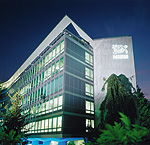
Nestlé S.A.
with its headquarters in Vevey, Switzerland, is the world’s leading nutrition, health and wellness company. In 2011 the Nestlé Group made sales of 83.6 billion Swiss Francs and recorded a net profit of 9.5 billion Swiss Francs, reporting double-digit growth rates in Latin America and Asia. Nestlé operates 461 production sites in 83 countries and has over 330,000 employees. In 1867 company founder Henri Nestlé succeeded in manufacturing a soluble milk powder that could be fed to babies. Today Nestlé is the worldwide leader in product categories such as soluble coffee, infant nutrition, bottled water, condensed and evaporated milk, ice cream, as well as chocolate and malt drinks, and culinary. The Group is also a co-leader in pet care. In addition, it holds approximately 30 percent of the shares in the L’Oréal cosmetics group.
PHOTOS: PETER RIGAUD





